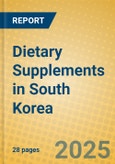The Dietary Supplements in South Korea report offers a comprehensive guide to the size and shape of the market at a national level. It provides the latest retail sales data 2020-2024, allowing you to identify the sectors driving growth. Forecasts to 2029 illustrate how the market is set to change.
Product coverage: Combination Dietary Supplements, Herbal/Traditional Dietary Supplements, Non-Herbal/Traditional Dietary Supplements.
Data coverage: Market sizes (historic and forecasts), company shares, brand shares and distribution data.
Why buy this report?
- Get a detailed picture of the Dietary Supplements market;
- Pinpoint growth sectors and identify factors driving change;
- Understand the competitive environment, the market’s major players and leading brands;
- Use five-year forecasts to assess how the market is predicted to develop.








